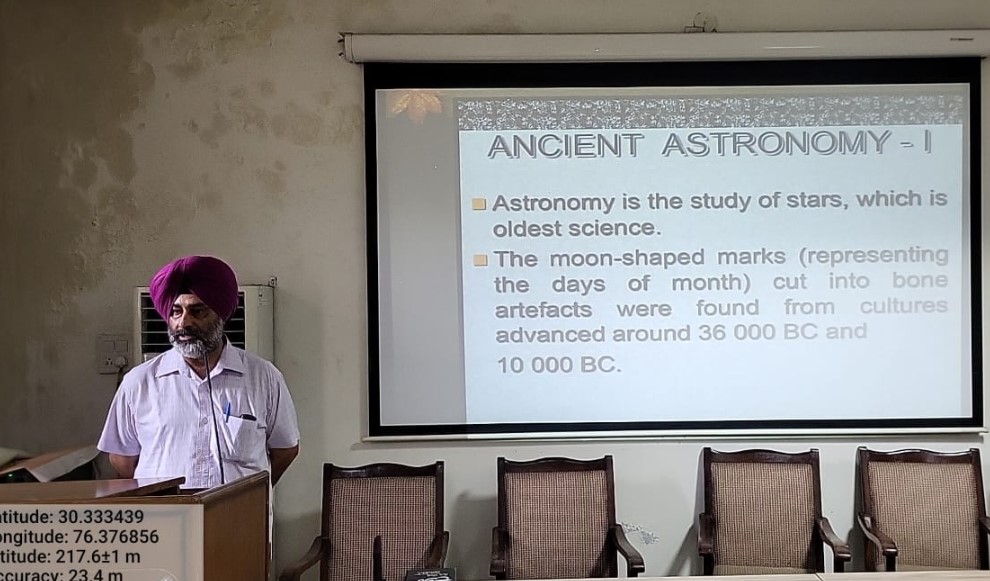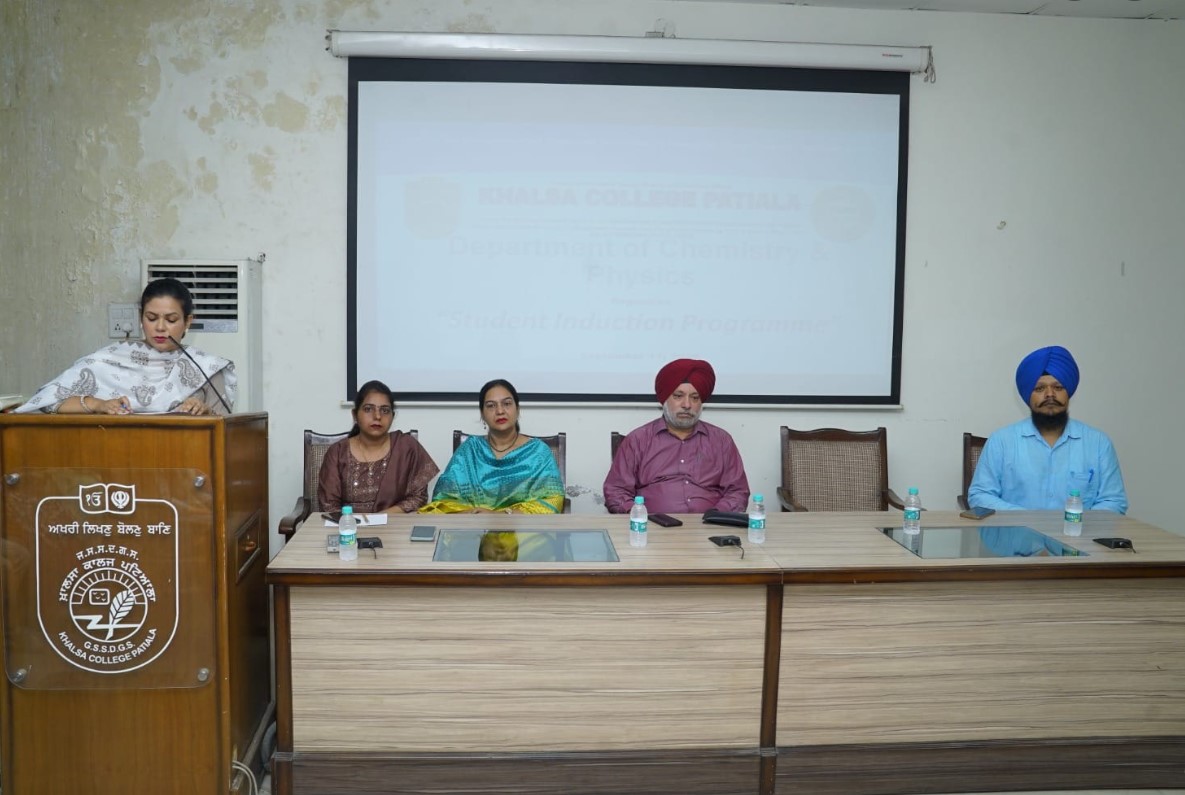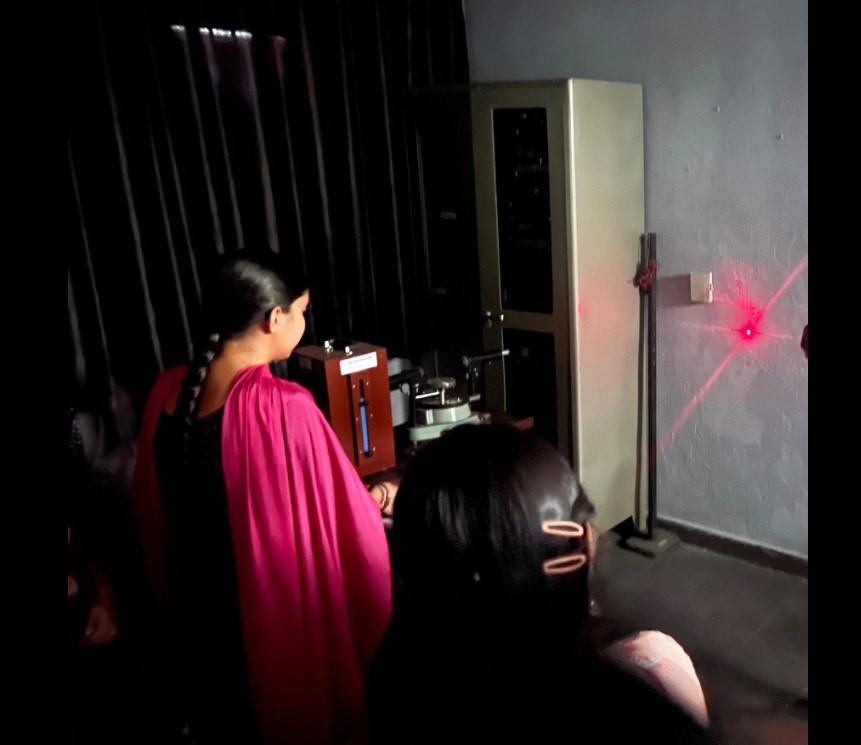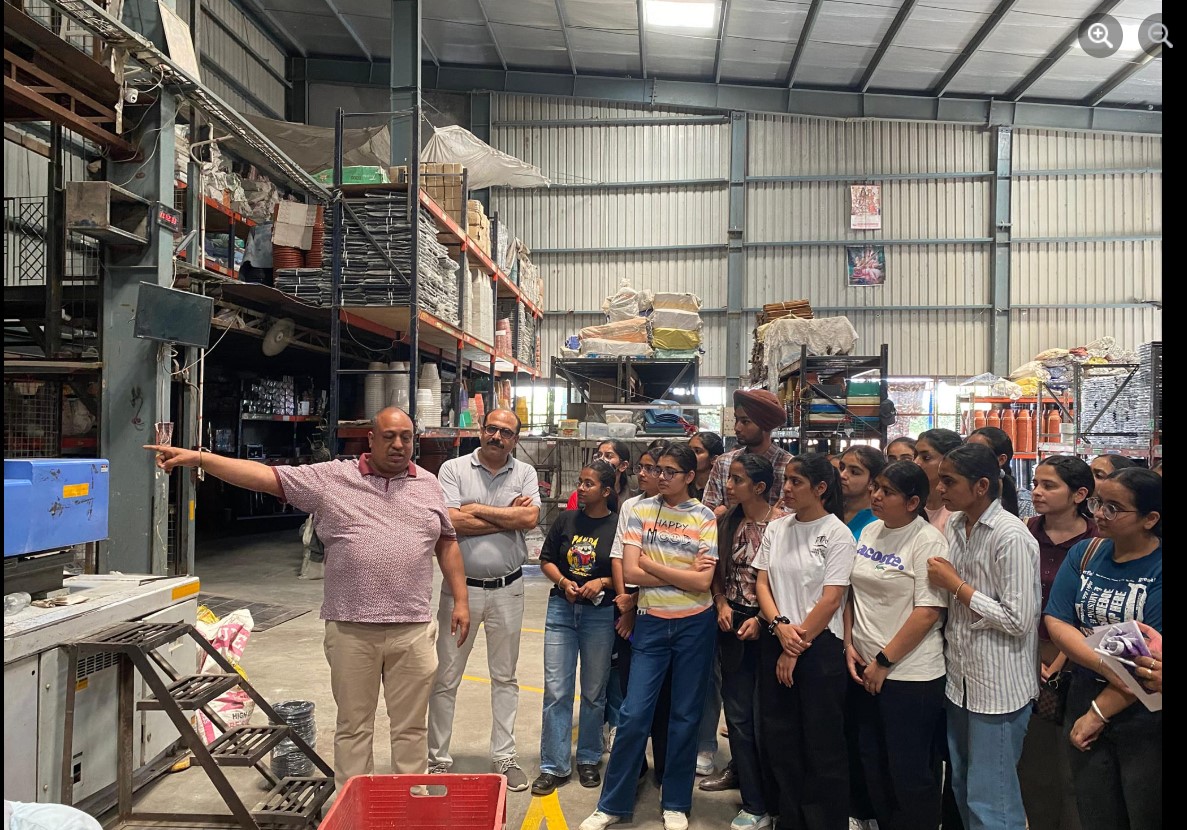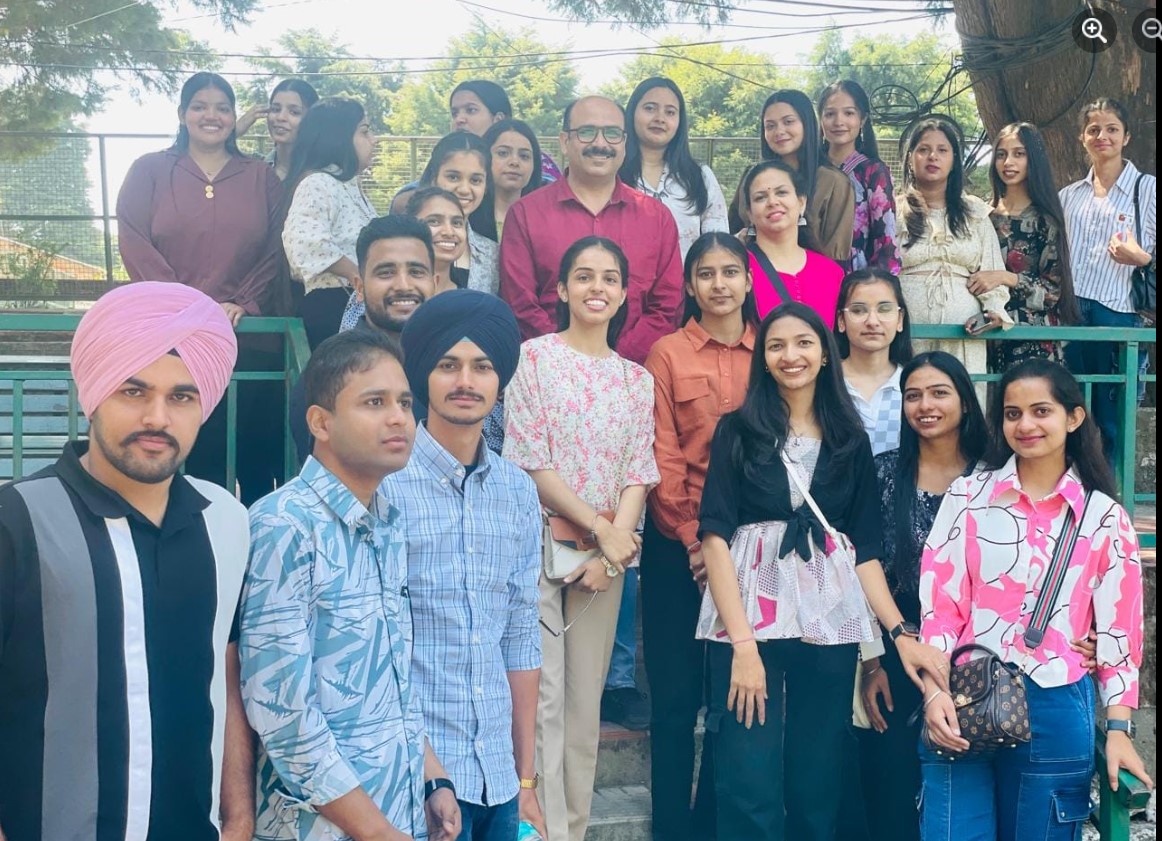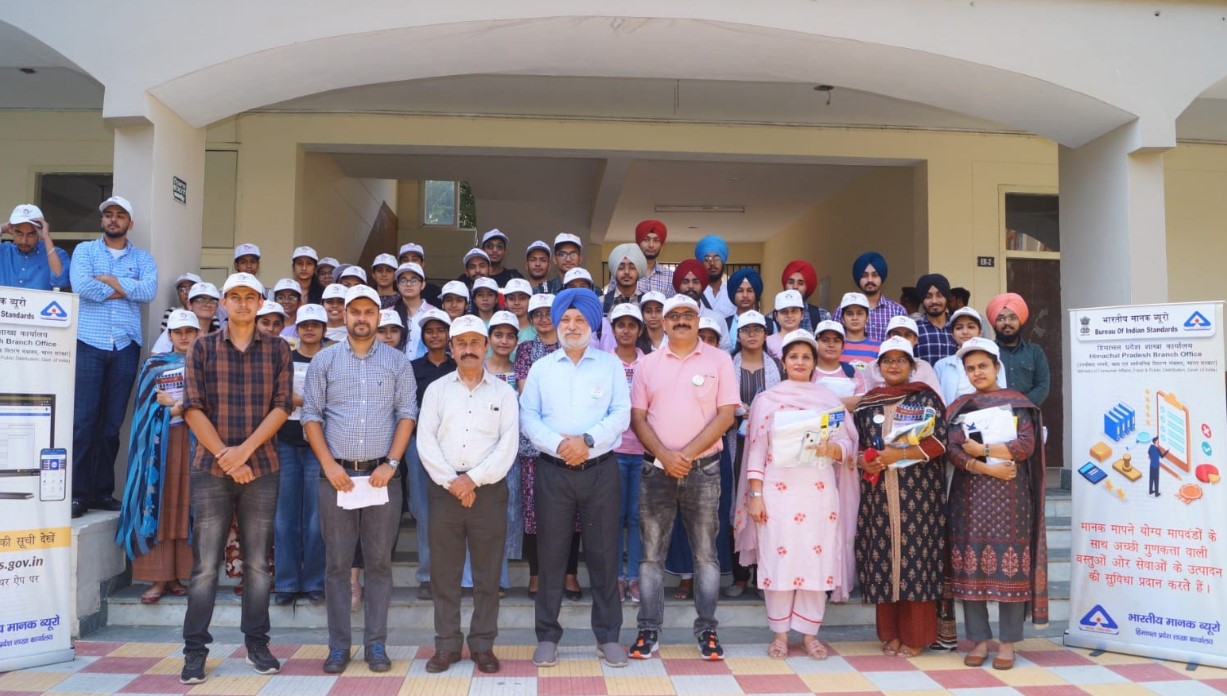About P.G.Department of Physics
"All of physics is either impossible or trivial. It is impossible until you understand it, and then it becomes trivial." by ERNEST RUTHERFORD
The Department of Physics at General Shiv Dev Singh Diwan Gurbachan Singh Khalsa College was established in 1960 with an ambition to pursue high-level teaching methodologies in advanced areas of experimental & theoretical Physics, and interdisciplinary areas of Science & Technology. Initially college campus was situated in Shri. Dukhniwaran Sahib (Patiala) but later in 1972, Physics department was shifted to the present campus. During session 2011-12, under the guidance and vision of Dr. Dharminder Singh Ubha, Principal of college, Post Graduate Physics Department was established. Currently, Department is supervised by Dr. Arvind Sabharwal as Head of the Department of Physics.
Faculty members had worked very hard to establish the Physics laboratory (Mechanics, Optics, Nuclear, Thermal & electronics) with numerous equipments as per the new syllabus and guidelines suggested by New educational Policy (NEP). The department is covered under Star College strengethning scheme by DBT, Govt of India.
Physics Department offers two undergrauate courses alongwith one post graduate course.
- M.Sc Physics (Physics)
- B.Sc (Honors) in Physics
- B.Sc (Non-Medical)
The mission of the department of Physics is to provide high quality teaching and learning experience through these programs. The department is committed to achieve excellence in research in diverse areas of pure and applied physics.
• Teaching Excellence: Excellence in teaching has always been one of the main imperatives of the department. It periodically reviews and redesigns existing courses and introduces new courses and programs geared towards current research and industry. It explores new dimensions in teaching and learning and uses various platforms and methodologies. The department is always in the continuing process of strengthening the existing programs.
• Research Excellence: The faculty members of the department carry out research in almost all the major areas of Physics such as experimental to theoretical aspects of Quantum computation, Condensed Matter Physics, Nuclear Physics, Solid State Physics, Micro-Electro-Mechanical Systems (Fabrication and Experimental Techniques). The department is now vigorously scaling up its research activity and giving more visibility to it. The volume of research publications in peer reviewed journals of repute has been increasing steadily. Regular visits of experts from Academia and industry for technical and popular talks add to the vibrant academic culture of collaboration and sharing. The Department organizes national and international conferences from time to time.
• Faculty Leadership in Administration: The faculty members of the department make significant contribution to administrative leadership and various institute activities and initiatives.
The P.G Department of Physics came out with five well equipped laboratories with latest instruments for M.Sc. and B.Sc students. These are
- Electronics Lab
- Optics lab
- Nuclear Physics lab
- Mechanics lab
- Thermal lab
The major instruments in the lab are Dual beam Oscilloscope, Nuclear Counter, NaI (Tl) Scintillation detector and Michelson Interferometer.
MEET THE FACULTY
P.G.Department of Physics
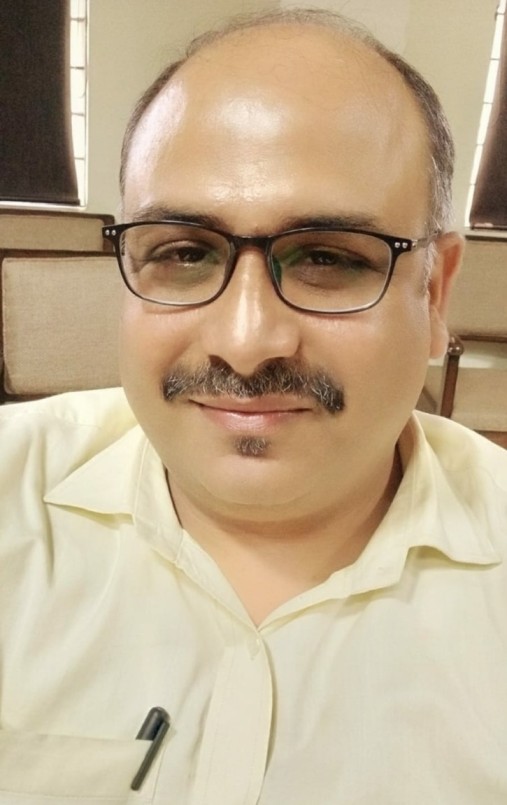
Dr. Arvind Deepak Sabharwal
Assistant ProfessorM.Sc (Physics), Ph.D (Nuclear & Radiation Physics), Post-Doc (UGC-Dr. D.S. Kothari) & Head, Department of Physics
SEE PROFILEDr. Supriya Goyal
Assistant ProfessorPh.D, NET(CSIR)
SEE PROFILE
Dr. Varinderjit Kaur
Assistant ProfessorPh.D
SEE PROFILE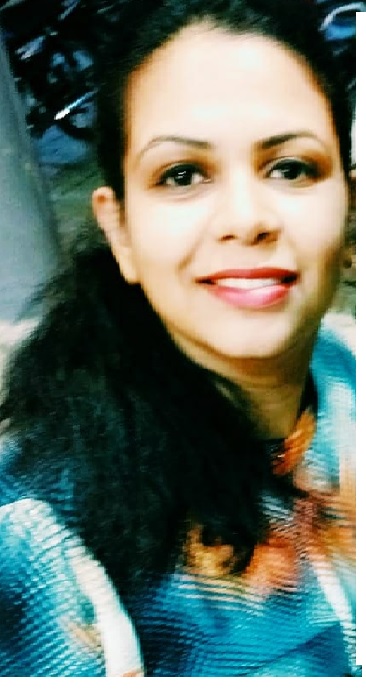
Dr. Kirandeep Sandhu
Assistant ProfessorPhD in Nuclear Physics
SEE PROFILE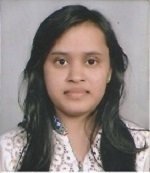
Anisha Gupta
Assistant ProfessorM.Sc(Physics)
SEE PROFILE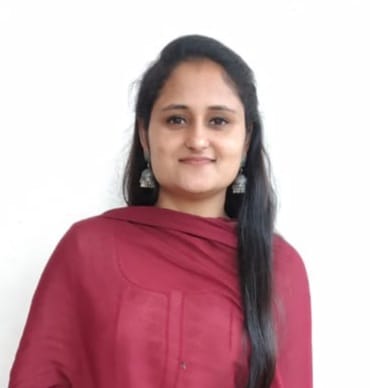
Dr. Sandeep Kaur
Assistant ProfessorPh.D.
SEE PROFILE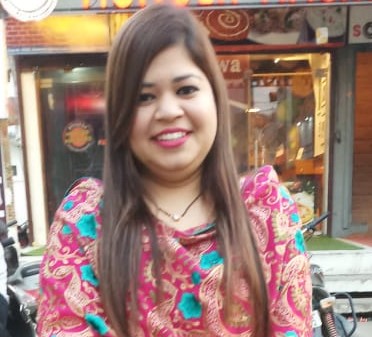
Bhawna Tanwar
Assistant ProfessorM.Sc. , CSIR-UGC-NET
SEE PROFILE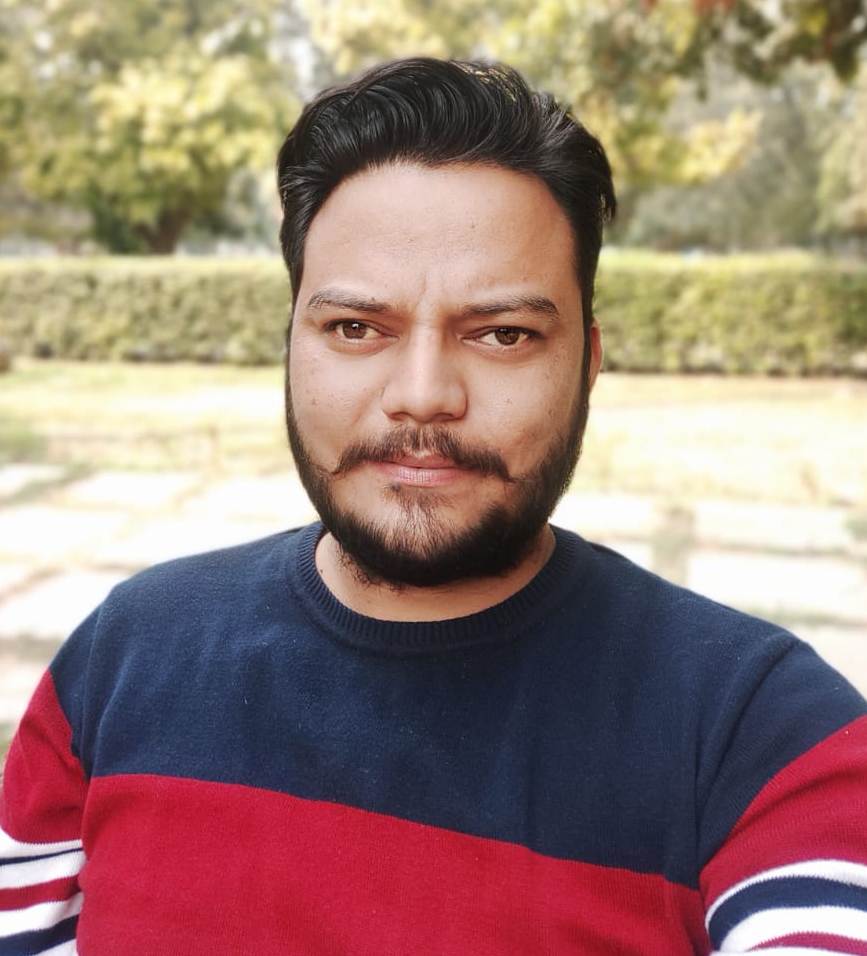
Dr. Davinder Kumar
Assistant ProfessorPh.D.
SEE PROFILE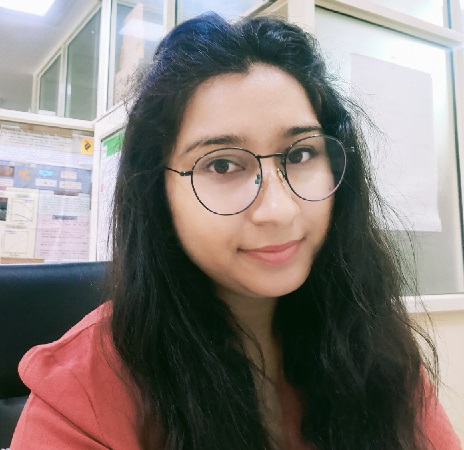
Dr. Shobhneek Kaur
Assistant ProfessorPh.D. in Materials Science
SEE PROFILECOURSES OFFERED
P.G.Department of Physics
Masters in Physics (Pure Physics)
Masters in Physics programme at P.G department of Physics, Khalsa College, Patiala is a two-year full-time programme. In the M.Sc Physics course, students can learn about various disciplines like Classical Mechanics, Quantum Mechanics, Nuclear and Particle Physics, Electronics, Electrodynamics, Condensed Matter Physics etc. The entire course is the combination of the academic curriculum, laboratories, thesis work and projects. This course provide knowledge, general competence, and analytical skills on an advanced level needed in industry, education and research.
Programme Specific Outcomes
During MSc-Physics, students will be able to understand:
- PSO1: the basic concepts of physics particularly in Classical mechanics, Quantum mechanics, Electrodynamics and Electronics to appreciate how diverse phenomena observed in nature follow from a small set of fundamental laws.
- PSO2: Learn to carry out experiments in basic as well as certain advanced areas of Physics such as Nuclear Physics, Electronics and Lasers.
- PSO3: A research oriented learning that develops analytical and integrative problem-solving approaches.
(Click here for Subject/Course Details)
Bachelor in Science (Honors) (B.Sc Honors Physics)
B.Sc Physics is a 3-year undergraduate course that provides a systemic understanding of core physical concepts, principles and theories along with their applications.This course aims to provide the aspirants with the foundation knowledge possible for a Science-based career.
Programme Specific Outcomes
On completion of the Programme student will be able to:
- PSO1:Articulate in-depth understanding of core knowledge on various subjects of Physics, especially in the area of Mechanics and Mathematical ideas of Physics, Electronics, Quantum Physics, Nuclear Physics.
- PSO2:Demonstrate skills and competencies to conduct scientific experiments.
- PSO3: Identify their area of interest.
- PSO4:Relate their knowledge and skills in carrying out independent work in the laboratories.
- PSO5:Discuss, debate and communicate in a clear and logical ways to understand the basic concepts of Physics.
(Click here for Subject/Course Details)
Bachelor in Science (Non Medical) (B.Sc. Non-Medical)
B.Sc (Non-Medical) is a 3-year undergraduate course that provides a systemic understanding of core Physics, Mathematics and Chemistry/ Computer and their applications. This course provides the knowledge of the basic concepts, fundamental principles, and the scientific theories related to various scientific phenomena and their relevancies in the day-to-day life.
Programme Specific Outcomes (Physics)
On completion of the Programme student will be able to:
- PSO1: Grasp in depth understanding of core knowledge on various subjects of Physics, especially in the area of Mechanics, Electronics, Quantum Physics, Nuclear Physics, Thermal and Optics.
- PSO2: Read, understand and interpret physical information-verbal, mathematical and graphical.
- PSO3: Perform experiments and interpret the results of observation, which includes making an assessment of experimental uncertainties.
- PSO4:Understand the fundamental theory of nature at small scale & levels of atom & subatomic particles.
- PSO5:Discuss, debate and communicate in a clear and logical ways to understand the basic concepts of Physics.
(Click here for Subject/Course Details)
Certificate Couse (Three Months)
- Solar PhotoVoltaic System Design & Installation
OUR ACTIVITIES
P.G.Department of Physics
Important Links
P.G.Department of Physics
(1) Dr Arvind Sabharwal https://scholar.google.com/citations?hl=en&user=nHTUE30AAAAJ
(2) Dr Supriya Goyal https://scholar.google.com/citations?user=DCYISvcAAAAJ&hl=en
(3) Dr Varinderjit Kaur https://scholar.google.com/citations?user=CvtHJPEAAAAJ&hl=en
(4) Dr Kirandeep Sandhu https://scholar.google.com/citations?user=bOxSBS4AAAAJ&hl=en
(5) Dr Sandeep Kaur https://scholar.google.co.in/citations?user=52deiXQAAAAJ&hl=en
(6) Dr Davinder Kumar https://scholar.google.co.in/citations?user=xQ4nWK4AAAAJ&hl=en
(7) Dr Shobhneek Kaur https://scholar.google.co.in/citations?user=3qzCyIsAAAAJ&hl=en
- Adder and Subractor
- Amplitude Modulation/ Demodulation
- Amplitude modulation/ demodulation (2)
- Baising Of Transistor for Class 'A' operation
- FET
- Frequency modulation & Demodulation
- Bread board and ICs
- Frequency modChractersticsulation & Demodulation(2)
- Logic Gates
- Oscilltors
- Push-Pull Amplifier
- Rectifiers
- CHARACTERISTICS OF SCR, WIOSFET, IGBT, TRIAC & DIAC
- Solar Cell
- Diode Rectifier and Filter Circuits
Mechanics lab
DBT Star College
Activities
|
Activity Name |
Year |
Activity Link |
|
Five-day National Hands-on Training on Electronic Projects for Beginners, February 15-19, 2021 |
2021 |
http://khalsacollegepatiala.org/activityreport/actname/activity?file=phyworkshop2 |
|
Five days Online lecture Series, 22nd to 26th March-2020 |
2020 |
http://khalsacollegepatiala.org/activityreport/actname/activity?file=lec-series-1 |
|
Frontiers of Science and Technology in Defence, August 7, 2020
|
2020 |
http://khalsacollegepatiala.org/activityreport/actname/activity?file=phyworkshop1 |
|
Two days online workshop on latex, 1 and 2 March 2021 |
2021 |
http://khalsacollegepatiala.org/activityreport/actname/activity?file=phyworkshop4 |
|
Breadboard workshop, 11-12 Feb,2021
|
2021 |
http://khalsacollegepatiala.org/activityreport/actname/activity?file=Phyworkshop |
Activities of Physics Department 2022-23
List of apparatus purchased under DBT
Details of Equipment Procured: 2020-21
|
S. No. |
Name of Equipment |
Number of Units |
|
1. |
Newton Ring Apparatus |
3 |
|
2. |
Katers Pendulum |
3 |
|
3. |
Hartley and Colpitts Oscillator Kit |
2 |
|
4. |
Callender and Barnes Apparatus |
3 |
|
5. |
Bar Pendulum |
3 |
|
6. |
Ballistic Galvanometer |
4 |
|
7. |
Bread boards and IC |
5 |
|
8. |
Operational Amplifier kit |
2 |
|
9. |
Optical Fibre Kit |
2 |
|
10. |
Rectifier with filter circuits |
3 |
|
11. |
Searls Apparatus |
3 |
|
12. |
Sextant with stand |
3 |
|
13. |
Spectrometer with Sodium & Mercury Lamp light arrangement |
4 |
|
14. |
Thermocouple |
3 |
|
15. |
Clipping and Clamping Apparatus Kit |
4 |
Details of Equipment Procured: 2021-22
|
S. No. |
Name of Equipment |
Number of Units |
|
1 |
Curie Temperature Apparatus |
1 |
|
2 |
Magneto Resistance in Semiconductors |
1 |
|
3 |
Dosimeter |
1 |
|
4 |
Ultrasonic Interferometer |
1 |
|
5 |
Lamp and Scale Arrangement |
4 |
|
.6 |
GM Counter |
1 |
|
7 |
Franck Hertz with CRO |
1 |
|
8 |
ESR |
1 |
|
9 |
Micheloson Interferometer |
1 |
|
10 |
Muffle Furnace (High temprature) |
1 |
|
11 |
Function Generator |
1 |
|
12 |
Sonicator |
1 |
|
13 |
Cathode Ray Oscilloscope (CRO) |
1 |
|
14 |
Digital Storage Oscilloscope (DSO) |
1 |
|
15 |
Books |
14 |
Pictures of Instruments Purchased Under DBT
.jpg)
Ballistic Galvanometer

Bread Board

Clipping and Clamping Circuit

Curie Temperature Kit

Dosimeter

Gm Counter

ESR

Franck Hertz

Function Generator

Half and Full Wave Rectifiers

Hartley and Colpitt Oscillators

Bar Pendulum
.jpg)
Callender and Barnes

Digital Oscllisope
.jpg)
Fibre Optic Trainer

Hall Effect
.jpg)
Hartely and Colpitt oscillators

Kater Pendulum

Michelson Interferometer

Operational Amplifiers

Searles Apparatus
.jpg)
Sextant

Sextant

Thermocouple

Ultrasonic Interferometer

Muffle Furnace

Digital Ultrasonic Cleaner
List of Books in Physics Department Purchased Under DBT
|
S. No |
Name of Book |
Authors |
|
|
Differential Equations with Applications and Historical Notes |
George F. Simmons, 2007, McGrawHill.
|
|
|
Transducers and Instrumentation |
D.V.S. Murty, 2nd Edition, PHI Learning Pvt. Ltd. |
|
|
Mechanics, Berkeley Physics |
C.Kittel, W.Knight, et.al. 2007, Tata McGraw-Hill. |
|
|
Introduction to Numerical Analysis, |
S.S. Sastry, 5thEdn., 2012, PHI Learning Pvt.Ltd. |
|
|
The Physics of Waves and Oscillations |
N.K. Bajaj, 1998, Tata McGraw Hill. |
|
|
Introduction to Quantum Mechanics |
David J. Griffith, 2005, Pearson Education |
|
|
Heat and Thermodynamics |
M.W. Zemansky, Richard Dittman, 1981, McGraw-Hill. |
|
|
Mathematical Methods for Physicists |
G.B.Arfken, H.J.Weber, F. E. Harris, 2013, 7th Edn, Elsevier |
|
|
Quantum Mechanics: Theory & Applications |
A.K.Ghatak& S.Lokanathan, 2004, Macmillan. |
|
|
Digital Systems: Principles & Applications |
,R.J. Tocci, N.S.Widmer, 2001, PHI Learning |
|
|
Concepts in Thermal Physics |
S.J. Blundell and K.M. Blundell, 2nd Ed., 2012, Oxford University Press. |
|
|
Microelectronic circuits, |
A.S. Sedra, K.C. Smith, A.N. Chandorkar, 2014, 6thEdn., Oxford University Press. |
|
|
Theoretical Nuclear Physics |
J.M. Blatt &V.F.Weisskopf (Dover Pub.Inc., 1991) |
|
|
Introduction to High Energy Physics |
D.H. Perkins, Cambridge Univ. Press |
Contact Us
P.G.Department of Physics


